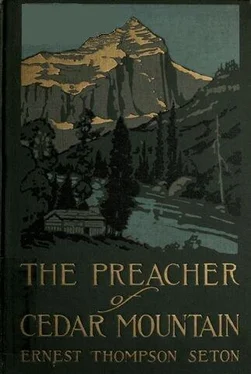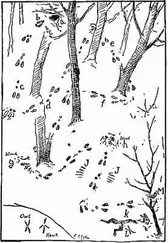Ernest Seton - The Preacher of Cedar Mountain
Здесь есть возможность читать онлайн «Ernest Seton - The Preacher of Cedar Mountain» весь текст электронной книги совершенно бесплатно (целиком полную версию без сокращений). В некоторых случаях можно слушать аудио, скачать через торрент в формате fb2 и присутствует краткое содержание. Год выпуска: 2009, Жанр: Прочие приключения, на английском языке. Описание произведения, (предисловие) а так же отзывы посетителей доступны на портале библиотеки ЛибКат.
- Название:The Preacher of Cedar Mountain
- Автор:
- Жанр:
- Год:2009
- ISBN:нет данных
- Рейтинг книги:3 / 5. Голосов: 1
-
Избранное:Добавить в избранное
- Отзывы:
-
Ваша оценка:
- 60
- 1
- 2
- 3
- 4
- 5
The Preacher of Cedar Mountain: краткое содержание, описание и аннотация
Предлагаем к чтению аннотацию, описание, краткое содержание или предисловие (зависит от того, что написал сам автор книги «The Preacher of Cedar Mountain»). Если вы не нашли необходимую информацию о книге — напишите в комментариях, мы постараемся отыскать её.
The Preacher of Cedar Mountain — читать онлайн бесплатно полную книгу (весь текст) целиком
Ниже представлен текст книги, разбитый по страницам. Система сохранения места последней прочитанной страницы, позволяет с удобством читать онлайн бесплатно книгу «The Preacher of Cedar Mountain», без необходимости каждый раз заново искать на чём Вы остановились. Поставьте закладку, и сможете в любой момент перейти на страницу, на которой закончили чтение.
Интервал:
Закладка:
And thither that night with two friends went Shay. It was a very simple lodging. These men habitually avoid display. The janitor knew all too well who Shay was.
"Is Squeaks at home?"
"Yes, I believe so."
"I'm going up to see him, and if I lay him over my knee and spank him till he squeals, ye needn't worry; it's nothing." Then up went Shay, while his friends stayed below, one at the front of the house and the other in the lane that commanded the back.
The trembling janitor heard the heavy foot go up the wooden stairs; he heard a voice, then a crash as of a door forced open, then heavy steps and a pistol shot. A window was opened behind the house, and something was thumped down into the back yard. A little later, the boss came hurriedly down the stairs. The timid janitor and his trembling wife saw the big man step out with a bundle under his arm. Then all was still.
After twenty minutes of stupefaction, they began to realize that they should go up to the Judge's room. They mounted the stairs together, carrying a lamp. The door had, evidently, been forced. The room was in some disorder; the drawers of the desk were open, and papers scattered about. On one or two of the papers was fresh blood. The window was closed, but not fastened; the end of the curtain under it seemed to give proof that it had recently been opened. On the sill was more fresh blood.
There was no sign of the Judge.
As they gazed about in horror, they heard a noise in the back yard and looking out saw, very dimly, two men carrying off a heavy object, they lifted it over the back fence and then followed, to disappear.
Schmidt, the janitor, was terror-stricken. Evidently, the Judge had been murdered and his body was now being made away with. What was to be done? If he interfered, the murderers would wreak their vengeance on him; if he refrained, he would be blamed for the murder or at least for complicity.
"I tink, Johann, dere's only one ting, and dat is go straight an' tell de police," said his wife. As they stood, they heard a light foot on the stairs. Their hearts stood still, but they peered out to see a woman in a gray cloak step into the street, and they breathed more freely. Now they rushed to the station house and told their tale in tears and trembling.
The Police Captain was scornful and indifferent. Had there been but one witness, he might have ordered him away; but two witnesses, intensely in earnest, made some impression. He sent an inspector around to see. That official came back to report the truth of the statement made by the Schmidts, that the Judge's room was empty, upset, and had some blood stains; but he attached little importance to the matter. He had, however, locked up and sealed the door, pending examination.
Next morning, there was an attempt to hush the matter up, but a reporter appeared in the interests of a big paper, and by a clever combination of veiled threats and promises of support, got permission to see the room. The reporterial instinct and the detective instinct are close kin, and the newspaper published some most promising clues: The Judge was visited at midnight by a man whom he had robbed and who had threatened to kill him; a broken door, papers stolen, a scuffle, traces of human blood (the microscope said so) in several places, blood on the window sill, a heavy something thrown out of the window and carried off by two men, blood on the back fence, and no trace of the Judge.
It was a strong case, and any attempt to gloss it over was rendered impossible by the illustrated broadside with which the newspaper startled the public.
CHAPTER LVII
The Trial
All Chicago remembers the trial of Michael Shay. It filled the papers for a month; it filled folk's minds and mouths for two. Many a worse murder had been quietly buried and forgotten, but this was too conspicuous. The boss, facing a decline of his power, had undoubtedly murdered the man he had begun to fear, and the parties in control of all the machinery of justice were against the accused.
The case was thoroughly threshed out. Shay had openly threatened the life of Squeaks; he had tried before to do him hurt; had gone with two men to Squeaks's lodgings; had warned Schmidt that there was going to be "a little fuss"; had broken open the door and got certain papers—his own property, undoubtedly, but now splashed with blood; a shot had been heard—a heavy something thrown from the back window and then carried off by two men; blood on the floor, the sill and the back fence; and the Judge had disappeared from the face of the earth. The case was clear, the jury retired, but quickly brought in a verdict of guilty, although at every point there was nothing but circumstantial evidence.
Jim Hartigan was one of the first friends to call on Shay after his arrest, and Belle came soon after. They heard his story, which was simple and straight: Squeaks was holding the papers which would be, at least, damaging to Shay's property and reputation; he got them in confidence and then defied Shay to come and take them. Shay decided it would be well to take two witnesses and went, as planned, to Squeaks's apartments. Finding the door locked and believing that Squeaks was inside, he forced it open; the room was dark and no one was there. He lighted the gas and rummaged through the desk for the papers that belonged to him, paying no attention to any others. He saw blood on some of the papers, but didn't know where it came from. As he was coming away, he heard a pistol shot, either upstairs or outside, he didn't know which. He knew nothing about anything thrown from the window. He got his own property and came away.
Although every particle of evidence adduced by the prosecuting attorney was circumstantial, it was very complete. Some juries would have felt reasonable doubt, but no one could get over the facts that Shay had threatened Squeaks's life and that Squeaks had disappeared after a visit from Shay which left traces of blood in Squeaks's apartment. The trial over, the verdict of guilty rendered, Shay was asked if he could offer any reason why he should not be condemned. He rose and said: "Only that I didn't do it. I never saw him from that time in the club a week before."
Then the judge pronounced the awful words: "...Hanged by the neck till you are dead." Shay sat stunned for a minute, then, when the jailor tapped his shoulder, rose and walked silently forth to the cell of the doomed.
It is the hour of trial that sifts out your friends. There were two at least who followed every move in that crowded court room—Hartigan and his wife. They had learned that the crude, brutal exterior of the prizefighter held a heart that was warm and true. They had learned that they could go to him with certainty of success when they wanted help for some struggling man or woman in their ward. They knew that he would not drive a bargain for his help, nor plaster his gift with religious conditions. It was enough for him to know that a fellow-being was in need and that he had the power to help him. Shay was a product of submergence and evil system; he was wrong in his theories, wrong in his methods, wrong in his life; but his was a big, strong spirit—ever kind. And out of the strange beginnings there had grown a silent but real friendship between the Hartigans and himself.
On the black day of the verdict and the sentence, Belle and Jim were sadly sitting at home. "Jim," she said, "I know he didn't do it; his story is so simple and sound. It's easy to get human blood if you have a friend in the hospital; he is innocent. We know that Squeaks could easily have access to a room upstairs; that bundle may have been thrown out from the window merely as a part of a plot. Everything is against Shay now because he is in wrong with the party; but, surely, there is something we can do."
Читать дальшеИнтервал:
Закладка:
Похожие книги на «The Preacher of Cedar Mountain»
Представляем Вашему вниманию похожие книги на «The Preacher of Cedar Mountain» списком для выбора. Мы отобрали схожую по названию и смыслу литературу в надежде предоставить читателям больше вариантов отыскать новые, интересные, ещё непрочитанные произведения.
Обсуждение, отзывы о книге «The Preacher of Cedar Mountain» и просто собственные мнения читателей. Оставьте ваши комментарии, напишите, что Вы думаете о произведении, его смысле или главных героях. Укажите что конкретно понравилось, а что нет, и почему Вы так считаете.




